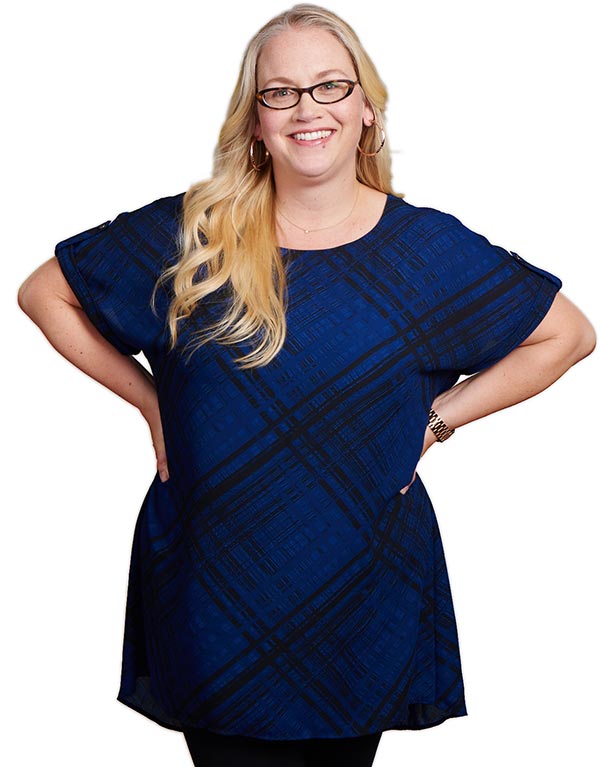 HealthyGirl.org reader Angie told me that she’s had a lot of success recently using cognitive behavioral therapy to help her get (and stay) sane about food. CBT may sound intimidating, but it’s just a style of talk therapy—one that I heard many many experts recommend when I was interviewing them for my book about binge eating. Take a look and feel free to weigh in with your thoughts about CBT, or therapy in general. xo…Sunny
HealthyGirl.org reader Angie told me that she’s had a lot of success recently using cognitive behavioral therapy to help her get (and stay) sane about food. CBT may sound intimidating, but it’s just a style of talk therapy—one that I heard many many experts recommend when I was interviewing them for my book about binge eating. Take a look and feel free to weigh in with your thoughts about CBT, or therapy in general. xo…Sunny
Hello world. This is Angie. I am humbled that Sunny asked me to talk about Cognitive Behavioral Therapy (CBT). While I have been in recovery from multiple eating disorders for 20+ years, note that I am not a licensed psychologist or medical professional. What I share here is based on my personal experience.
One more caveat: During my recovery I have often searched, in vain, for someone to give me the magic formula for a healthy life. I want someone, anyone, to tell me what to do so I don’t have to struggle with decisions re: food and exercise. This search has been in vain. Life is messy and I have to do the work to figure out what works for me, today, every day. There is nothing that always works. Now, if I haven’t scared you off, is more about CBT:
There are definitions of CBT that you can look up. For me, CBT means that I talk to a licensed psychologist on a regular basis. Out of these appointments, the psychologist observes patterns of behaviors and suggests that I reframe situations and thoughts. Here are a few examples to explain how CBT has helped me recover:
Recognize that I will always have thoughts related to disordered eating. I cannot remember a time when I did not try to find solace and control in food and how I consume food. Instead of banishing these thoughts, I recognize them, but choose not to dwell on them. Countering the food-related thoughts with positive mantras is hard, but helpful.
For example: When I think about binging or restricting, remember that I love to take the dog for a walk and look up at the sky. I am stronger than I think and feeling the fresh air on my face is a way for me to disconnect from the eating disorder. Disconnecting from the ED thoughts is very important for me as it’s been a primary tool in my recovery. It’s actually a tool that a lot of people use when healing from mental disorders. Have you watched A Beautiful Mind? While depression and eating disorders are not the same thing as schizophrenia, there is something to learn from watching how John Nash (played by Russell Crowe) healed from his mental illness. He became cognizant of schizophrenic-type thoughts and, eventually, chose to pivot away from those thoughts by recognizing what was real.
This idea of pivoting away from ‘crazy’ thoughts intrigued me so much that, in addition to watching the movie, I read the book. Nash found that he had to train his mind to ignore the thoughts that sabotaged him. I have found this approach useful when dealing with my ED thoughts. I have been working on my recovery for 20 years and still struggle. In times of stress, my mind tries to escape to thoughts of food and how I can control it. I must make diligent effort to pull myself out of these thoughts and focus on positive mantras.
I also try to think about the people around me. EDs are a disease of isolation. To pull myself away from the ED and isolation, I think, “How can you be an active listener to offer the people in life what they need?” I find fulfillment from healthy relationships with my husband and kids. Being physically, emotionally, and mentally present is healing. That said, it’s not always easy. I must put the phone down, take deep breaths, and follow the advice I give the kids: I need to be present when eating so I can enjoy the food. I should go outside to get some exercise every day. I should read for fun and for work. And, I should enjoy the struggles life presents because that’s when I’m truly growing and learning. No, it’s not easy, but it’s not supposed to be. As my therapist reminds me, we grow in crisis.
What has your experience been (if any) with CBT or other types of therapy? Would you recommend them to others trying to get sane about food?




![Have You Dared to Tell People About Your Eating Issues? [guest post]](../../../../wp-content/uploads/2011/05/3674715600_57a4e914e43-253x300.jpg)
![How to Deal With Big, Bad Food Guilt [guest post]](../../../../wp-content/uploads/2011/04/2551148803_0f4b7486be-300x242.jpg)

Angie, thank you so much for sharing your experience with CBT. I think it’s great that you are able to recognize your ED related thoughts and choose to ignore them. I think if you suppress your thoughts or your emotions for too long, they can explode and completely overwhelm you. I’ve always been in the habit of trying to banish unhealthy thoughts but I am going to try to recognize my unhealthy thoughts and choose not to act on them.
I agree 100% that ED and depression are isolating diseases. You become so overwhelmed with the negativity and inability to control your thoughts that interacting with people become nearly impossible. Yet it’s those interactions that can save you from ED and depression.
I personally found CBT very helpful, particularly Christopher Fairburn’s book, Overcoming Binge Eating. It helped to have structure in my eating and my day, it helped to fill in my food diary and only to weigh myself once a week. In fact it was only when I had techniques for eating and binging and not binging that I was able to start, slowly, dealing with the emotional issues behind my eating. It gave the panicking part of my mind something to focus on while the other part explored the pain.
I am in non-CBT therapy at the moment. I finally believe that I am worth spending money on, money to heal myself. In therapy we haven’t even mentioned my eating yet, but because we are dealing with other issues that I have been smothering with food for 10, 15 years, we are dealing with my eating, you know?
I think therapy will help if you find the right therapist and engage with the therapy and want to work on your eating, or your other points of pain and discomfort. It’s not a quick fix, but I am longing to know myself and heal myself and although it is challenging and sad and angry it is exciting and empowering too.
One point to note – certain people close to me are very resistant to me having therapy. Apparently this is common. But that’s their issue, not mine (or yours, if you are in the same situation). I hope that won’t stop any of you from seeking what you want.
A fabulous book suggestion, Rose. I listed that one on my recommended reading page.
Thanks for the feedback I find the comments so helpful as I’m continuing on my journey toward health. Last week I was on vacation with my husband’s parents and his sister’s family. It was a fun, but challenging week. I came back feeling inadequate and overwhelmed. When I re-read the post and see these comments, I’m reminded not to succumb to negative thoughts, but to put my lessons from therapy into practice.
I find the comments so helpful as I’m continuing on my journey toward health. Last week I was on vacation with my husband’s parents and his sister’s family. It was a fun, but challenging week. I came back feeling inadequate and overwhelmed. When I re-read the post and see these comments, I’m reminded not to succumb to negative thoughts, but to put my lessons from therapy into practice.
Thank you so much for this post. I have just read Christopher Fairburn’s book and it was like diving into cool water on a hot day. Finally someone who made sense, who understood me. Like you I’ve tried SO many different things to address “my eating problem” without realizing it was a disorder which can be treated by a methodological approach (that has nothing to do with severely restricting calories). I haven’t yet started CBT but I am in consultation with an eating disorder clinic of a major hospital in my area and they favor CBT. I find it so helpful to hear from a real person who has used it and benefited from it. Thank you for taking the risk to tell your story.
Thanks for joining the discussion, Marina! I’d love it if you would leave a review for the Fairburn book on HealthyGirl.org’s books page. I think experience like yours will really help someone pick up that book-and it’s a good one.
I read Sunny’s book a few months ago and it was such a huge help to see everything I was feeling and going through- written on paper. It was like I was reading the exact things I was feeling and thinking and it made me feel not so alone.
Since then, I have still been dealing with the issues and I kinda of got away from looking for a solution due to a bunch of other distractions in my life- mostly my boyfriend and I of 5 years breaking up, me moving into a new place and living with new people. As the holidays and all the commotion have slowed down, I am left feeling a little alone and turned to food and the idea of dieting again.
I had tried to get in touch with some psychologists to talk to and kept hitting dead ends when they were all full on clients. I had someone I know who was working hard to get me professionals to talk to but it just wasn’t working and I gave up and thought- “I’ll just figure it out on my own”. That has comprised of me just eating and being sad.
I randomly decided to come on here today after I thought about doing another diet, and reading this convinced me to keep trying. I just called and left a message with a psychologist who I had been recommended. I am also doing some more reading on the issues I am dealing with. I am starting to realize this is something that takes time and dedication and you really have to throw yourself into the process of getting better.
Thanks so much for getting me to take that step!
I read Sunny’s book this past spring, and the impact it had on my life was incredible. I too, felt that everything I had ever thought or experienced regarding my dysfunctional relationship with food was described so well on those pages. After reading (and re-reading) the book, I also found my way into CBT. Seeing a therapist helped me to realize that while my binge eating disorder will be something I always have to live with, it does not have to control me. My therapist helped me realize that my binges are part of a deep, hardwired response my body / brain has to anxiety and depression. I still struggle with binges and managing my anxiety, but I have to stay that I’m doing much better now than I was this time last year. Thank you Sunny, you’ll never know how profoundly your story has changed and improved my life.
LIKE
Cognitive behaviour therapy completely changed my life.
When I first started, I didn’t think there was much of a chance that I would experience any real change. I thought that food and eating was going to be such a difficult aspect of my life for the rest of my life.
Now, I no longer think of food all the time, cravings rarely trigger overeating and I crave healthy foods over junk food.
Angie, I’m glad you have found success with CBT, thanks for sharing.
CBT did not work for me. I have really connected with IFS (Internal Family Systems).
I found the Fairburn book interesting, but the documenting of everything you eat & the emphasis on weighing yourself are too triggering for me.
http://eatingasapathtoyoga.wordpress.com/2011/04/16/internal-family-systems/
So, as much as I want to eat mindfully…. I have this part that just will not loosen its grip on food. For a long time, I just wanted to rid myself of this part. It was a bad part. An evil part. It was a part that was ruining my life.
But as Elyse Resch says, “•We don’t do anything for “no good reason”. Rather than judging our actions, even if they appear to be negative or destructive, remember that there is always a pay-off to what we do. Whatever we’ve done is probably a coping mechanism when we know no better way to cope. We just have to ask ourselves whether the pay-off we get from maintaining this coping mechanism is still working or is still worth the benefit. We also must see if we can find or have the capacity for utilizing a healthier coping mechanism at this point in our lives. “
This is a time to get curious with this part.
This part has protected me from something that to me feels very dangerous and scary. And I don’t really know what that is about.
The part (who is nameless at present) keeps me from dealing with any type of negative emotion.
I would much rather be numbed out and distracted than welcome it, or even acknowledge the protection it provides me with.
But Byron Katie says, “An uncomfortable feeling is not an enemy. It’s a gift that says, ‘Get honest; inquire.’ “
CBT really helped me learned to get a handle on my depression and mild anorexia about 8 years ago. I’d like to go back for a bit more now that I’ve recently recognized a troubling new pattern of binge drinking one night followed by binge eating the next day. Unfortunately, I recently went back to school and can’t seem to get insured because of the therapy I received in the past.
It’s really a drag to realize that getting the help I needed would mark me as uninsurable. I wish I would have known how to help myself by going to some kind of annonymous support group that wouldn’t end up tarnishing my permanent record. Apparently, insurance companies will ask about mental health treatment for the last 10 years when you are applying for private insurance. I’m hoping my last application to company #3 will be accepted, otherwise I may have to opt for the much more expensive state health insurance. Boo. Keep my story in mind if you go to therapy. Try to stay under the radar if you think your job/insurance situation may change in the next 10 years.
I just finished reading this book, within a matter of days, and feel the most healthy I have in months thanks to this book and my recent therapy. My therapist suggests new thoughts to replace my existing negative thoughts typically aimed at myself. I look forward to my next therapy session before I even leave the room. I know the financial part of therapy can be daunting but we have made adjustments in our budgets to allow this for my health. I suggest anyone struggling with binge eating or an eating disorder to try therapy, it may just make you see the light at the end of the tunnel you’ve been trying to see.
I am currently in CBT and love it! We have only grazed the issue of my eating. Initially when I walked in my therapist’s doors I thought the only thing wrong with me was my insane thoughts about food. However, as the first session went on I ended up crying for half an hour about things I didn’t even know had an affect on me! Now we’re dealing with much deeper issues I’ve had all my life that started the whole food insanity and I constantly find myself resisting the process of getting better, its like my brain doesn’t want to let me move on and deal with anything. I tend to completely shut down like an off switch when I begin to feel overwhelmed. My therapist really helps because she almost always offers helpful suggestions to different triggers and helps me focus on being more self aware. I would suggest CBT to everyone who struggles- at least give it a try, you may not know how much you have been bottling up!